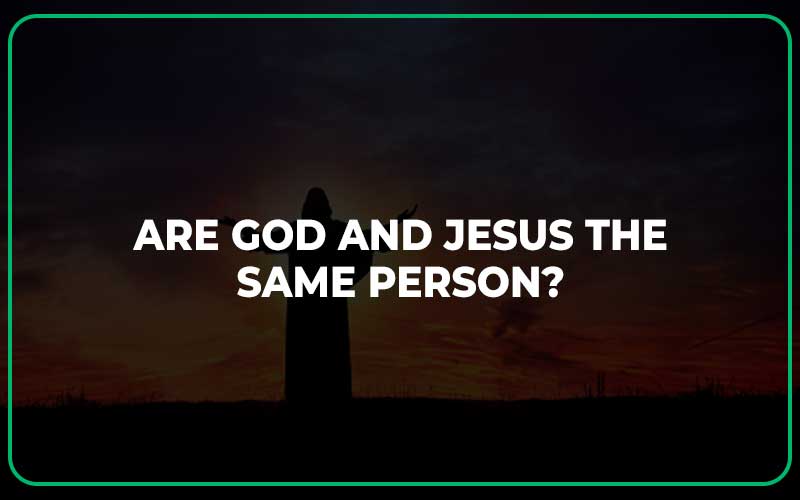Is God Jesus And The Lord The Same Person? Unveiling The Divine Connection
Let’s dive into a question that has sparked countless debates and deep reflections throughout history: Is God, Jesus, and the Lord the same person? Now, this isn’t just some random question—it’s a topic that dives deep into the heart of Christianity and faith. Whether you’re a devout believer, someone exploring religion, or simply curious about theology, understanding the relationship between God, Jesus, and the Lord is crucial. So, buckle up because we’re about to embark on a fascinating journey!
Religion has always been a topic that stirs emotions and sparks curiosity. For many, the idea of God, Jesus, and the Lord being interconnected is more than just a theological concept—it’s a cornerstone of faith. But what exactly does it mean? Are they truly the same person, or do they represent different aspects of divinity? This article aims to unravel this mystery while staying grounded in both scripture and logic.
As we explore this topic, you’ll discover how the Trinity plays a significant role in answering this question. We’ll also delve into biblical references, historical perspectives, and modern interpretations. By the end, you’ll have a clearer understanding of why this question matters so much and how it impacts the way people view their faith. Let’s get started, shall we?
- Drakes Penis Separating Fact From Fiction And Unveiling The Truth
- Why Mekka Mellia Blog Is A Mustvisit For Every Digital Explorer
Understanding the Trinity: The Key to the Mystery
Before we jump into specifics, let’s talk about the Trinity. This is one of the most fundamental concepts in Christianity, and it’s where the answer to our question begins. The Trinity refers to the idea that God exists as three distinct persons: the Father, the Son (Jesus), and the Holy Spirit. But here’s the kicker—they’re all part of one divine being. Mind-blowing, right?
Think of it like water. Water can exist in three states: solid (ice), liquid (water), and gas (vapor). Yet, it’s still water. Similarly, God manifests in three forms while remaining one entity. This concept helps explain why God, Jesus, and the Lord are often seen as interconnected yet distinct.
What Does the Bible Say About the Trinity?
The Bible doesn’t explicitly use the word “Trinity,” but it’s full of references that support this idea. For example, in Matthew 28:19, Jesus instructs his disciples to baptize “in the name of the Father and of the Son and of the Holy Spirit.” This verse clearly highlights the three-person structure of God.
- Ali Macgraw The Timeless Icon Who Stole Our Hearts
- Armslist Stl Your Ultimate Guide To Buying And Selling Firearms In St Louis
Another key passage is John 1:1-3, where it says, “In the beginning was the Word, and the Word was with God, and the Word was God.” This passage connects Jesus (the Word) to God, emphasizing their divine relationship.
Is Jesus the Same as God? Exploring the Connection
Now, let’s zoom in on Jesus. Is Jesus the same as God? Well, the answer is both yes and no. Jesus is considered the Son of God, which means he shares the same divine nature as God. However, he also took on human form, making him distinct from God the Father.
In John 10:30, Jesus himself says, “I and the Father are one.” This statement reinforces the idea that Jesus and God are interconnected. Yet, Jesus’ role as the Savior and mediator between humanity and God sets him apart.
Key Differences Between God and Jesus
- Role: God the Father is the creator and ruler of the universe, while Jesus is the savior and redeemer of humanity.
- Form: God exists in a spiritual form, whereas Jesus became fully human during his time on Earth.
- Purpose: God’s purpose is to govern and sustain creation, while Jesus’ mission was to bring salvation through his sacrifice.
Is the Lord the Same as God? Clarifying the Terminology
When we talk about the Lord, things can get a little tricky. In many cases, the term “Lord” is used interchangeably with God. However, it can also refer specifically to Jesus, depending on the context. So, is the Lord the same as God?
In the Old Testament, the Hebrew word “Yahweh” is often translated as “Lord.” This refers to God the Father. In the New Testament, however, the title “Lord” is frequently applied to Jesus, acknowledging his divine authority and power.
When Is the Lord Used for Jesus?
One of the most compelling examples of this distinction is in 1 Corinthians 8:6, where Paul writes, “Yet for us there is but one God, the Father… and one Lord, Jesus Christ.” Here, Paul clearly separates God the Father from Jesus Christ, while still recognizing their divine connection.
Historical Perspectives on God, Jesus, and the Lord
Throughout history, theologians and scholars have grappled with the relationship between God, Jesus, and the Lord. Some of the earliest Christian thinkers, like Augustine and Athanasius, played a crucial role in shaping the doctrine of the Trinity.
Athanasius, for instance, famously defended the idea that Jesus was fully divine, countering arguments that he was merely a human prophet. His work laid the foundation for the Nicene Creed, which affirms the Trinity as a core belief of Christianity.
Modern Interpretations of the Trinity
In recent years, scholars have revisited the concept of the Trinity, offering fresh insights. Some emphasize the relational aspect of the Trinity, highlighting how the Father, Son, and Holy Spirit interact with each other and with humanity. Others focus on the practical implications of the Trinity, such as how it shapes our understanding of community and love.
Scriptural Evidence Supporting the Connection
Let’s take a closer look at some of the key biblical passages that support the connection between God, Jesus, and the Lord. These verses provide a solid foundation for understanding their relationship.
- John 1:1-3: Establishes Jesus as the Word and connects him to God.
- Matthew 28:19: Highlights the three-person structure of God.
- 1 Corinthians 8:6: Distinguishes between God the Father and Jesus Christ.
- Hebrews 1:8: Declares, “But about the Son he says, ‘Your throne, O God, will last forever and ever.’”
How Do These Verses Fit Together?
When you piece these verses together, a clear picture emerges. God, Jesus, and the Lord are interconnected, yet they each play distinct roles in the divine plan. This balance of unity and diversity is what makes the Trinity such a profound concept.
Philosophical Implications of the Trinity
Now, let’s step back and consider the philosophical implications of the Trinity. This concept challenges us to think beyond traditional notions of identity and existence. How can one being exist in three distinct forms? It’s a question that has puzzled philosophers and theologians for centuries.
One way to approach this is through the lens of paradox. Paradoxes are ideas that seem contradictory but can still be true. The Trinity is a perfect example of this. While it may defy our logical understanding, it opens up new ways of thinking about divinity and existence.
What Does the Trinity Teach Us About God?
The Trinity teaches us that God is a complex and multifaceted being. It shows us that divinity is not limited to a single form or function. Instead, it encompasses love, sacrifice, and communion. This understanding can inspire deeper faith and a greater appreciation for the mysteries of existence.
Practical Applications in Daily Life
So, how does this knowledge impact our daily lives? Understanding the relationship between God, Jesus, and the Lord can deepen our spiritual practices and enhance our relationship with the divine. Here are a few practical ways to apply this knowledge:
- Prayer: When you pray, acknowledge the roles of the Father, Son, and Holy Spirit in your life.
- Worship: Celebrate the unity and diversity of the Trinity in your worship practices.
- Community: Embrace the relational aspect of the Trinity by building strong, loving communities.
Addressing Common Misconceptions
There are several misconceptions about the relationship between God, Jesus, and the Lord. Let’s clear up a few of them:
- Misconception 1: God, Jesus, and the Lord are completely separate beings. Reality: They are distinct persons but share one divine essence.
- Misconception 2: Jesus is not fully divine. Reality: Jesus is both fully divine and fully human.
- Misconception 3: The Trinity is a recent invention. Reality: The concept of the Trinity has been part of Christian theology since the early days of the church.
Why Do These Misconceptions Matter?
Misunderstanding the Trinity can lead to confusion about the nature of God and the role of Jesus. By addressing these misconceptions, we can foster a clearer and more accurate understanding of this important doctrine.
Conclusion: Embracing the Mystery
In conclusion, the question of whether God, Jesus, and the Lord are the same person leads us to the heart of the Trinity. While it may seem complex, this concept offers profound insights into the nature of divinity and our relationship with God. By embracing the mystery of the Trinity, we can deepen our faith and enrich our spiritual lives.
So, what’s next? Take a moment to reflect on what you’ve learned and how it impacts your understanding of God. Share this article with others who might benefit from it, and don’t forget to explore more resources on this topic. After all, the journey of faith is one that never truly ends.
Table of Contents
- Understanding the Trinity: The Key to the Mystery
- Is Jesus the Same as God? Exploring the Connection
- Is the Lord the Same as God? Clarifying the Terminology
- Historical Perspectives on God, Jesus, and the Lord
- Scriptural Evidence Supporting the Connection
- Philosophical Implications of the Trinity
- Practical Applications in Daily Life
- Addressing Common Misconceptions
- Conclusion: Embracing the Mystery



Detail Author:
- Name : Alf Johnson
- Username : ondricka.pinkie
- Email : jmitchell@yahoo.com
- Birthdate : 1990-08-28
- Address : 1227 Macejkovic Station Lorineton, WY 44625-8881
- Phone : 520.970.2698
- Company : Conroy-Gerhold
- Job : Database Administrator
- Bio : Delectus sed pariatur sed assumenda. Exercitationem qui cupiditate dolorum velit ipsam et. Voluptatum ipsa voluptatem enim quam.
Socials
instagram:
- url : https://instagram.com/jazmyne_dev
- username : jazmyne_dev
- bio : Odio neque eos praesentium mollitia. Commodi ducimus deserunt eos omnis ea aut nihil.
- followers : 299
- following : 1279
linkedin:
- url : https://linkedin.com/in/jazmyne6382
- username : jazmyne6382
- bio : Iusto deserunt cumque in modi ut.
- followers : 2377
- following : 194
facebook:
- url : https://facebook.com/jazmyne.sauer
- username : jazmyne.sauer
- bio : Recusandae ut incidunt laudantium vitae nobis.
- followers : 3584
- following : 643
twitter:
- url : https://twitter.com/sauer1991
- username : sauer1991
- bio : Ullam ratione architecto molestiae consequatur consequatur nemo dolorem quam. Repellat quaerat ab voluptate aut distinctio. Veritatis velit veniam amet quidem.
- followers : 1048
- following : 1647